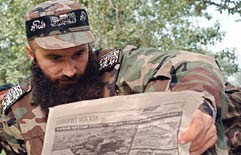
Joel Schalit is Managing Editor of Tikkun and also edited The Anti-Capitalist Reader.
Dear friend, accomplished author, viral San Franciscan, editor and intellectual; Joel Schalit is always good for a reasoned opinion on anything happening in the Middle East and beyond.
Educated at Reed College in Portland, and founder of several agit-noise bands including Elders of Zion, Schalit's last names bears an eerie resemblance to that of a recently captured Israeli soldier (no relation as far as Joel knows).
An Israeli-American Marxist who's always willing to indulge my inquiries into the background facts of contemporary hotspots, Schalit's historical knowledge and prescient views usually provide ample context.
Questions: ForwardEver
Answers: Joel Schalit
Q: Dispel my conspiracies: did Israel set up the soldier capture in Gaza to boost their aims to dismantle Hamas, or did it just happen to go down like this? What's the latest news on Cpl Gilad Shalit?
No, Israel did not engineer Shalit's capture as a pretext for entering Gaza. This was simply a military engagement that the Israelis lost. This does not mean, of course, that the Israel has not rationalized the event for its own strategic purposes - it has. But that is different than having set up the IDF unit that the tank gunner was a member of, as part of a larger plan to justify reentry into Gaza.
As of Tuesday, the Israelis were negotiating a prisoner exchange - through a third party - to have Shalit returned. If my information is correct, Hamas and Israel were determining the numbers of Palestinians to be released in exchange for Shalit. Given the events of the past 48 hours in Lebanon, I would wager that these negotiations have been put into jeopardy by Hezbollah demanding that the three Israeli troops they captured be part of any prisoner exchange, and that this exchange involve the return of Lebanese POWs as well.

Pictured: Basayev
Q: With Chechen Islamic leader Shamil Salmanovich Basayev (best known for orchestrating the Russian Theater takeover, and Beslan school massacre) now dead, and the G8 in Vladimir Putin's digs, will this be an opportunity for Russia shift from its support of Iran? Or will Putin demand too much of the G8 and end up with nothing again?
No. Russia's support of Iran has always been separate from its operations in Chechnya.
I understand the basis for this assumption - a perceived tie between Iran and the Islamic nationalist movement in Chechnya - but this is not entirely correct. It is my sense that the Chechen Islamist movement has relied on more autonomous Islamist sponsorships like al-Qaeda, and lesser known Islamist resistance organizations.
Russia's ties to Iran will remain strong because Russia makes far too much money off of supplying Iran with weapons and infrastructural assistance. This will most likely continue, because the Iranians have a lot of cash to spend on weaponry and engineering projects, and Iran can't get the same kind of support from the West.

Nerd or not? Ahmadinejad
Q: Mahmoud Ahmadinejad is a former engineer. Some say this has a lot to do with nuke lust and social awkwardness. And how about that flowery poetry? Is this "Revenge of the Nerds" gone ballistic?
Ahmadinejad's rise to power is a response to two things: First, as an ideological conservative in the mold of a '79 era Islamic revolutionary, to the US occupation of Afghanistan and Iraq; Second, to the neoliberal economic reformism of former Iran leader Khatami, who made moves to liberalise Iran's state-dominated economy, and who made explicit overtures to the West. Ahmedinejad has more of a statist view of the economy synonmous with the more socialist leanings of first generation Iranian revolutionaries. In essence, he's what we call a social theocrat.
Q: Seriously, Ahmadinejad seems like exactly the person the Ayatollahs wanted as their leader, with the US occupying two neighboring countries. Now Iran is pouring millions into supporting Shiite militias in Iraq and Hezbollah in Lebanon. Where is this leading the Middle East and the world, and what is a way out of this crisis?
Towards a regional Mid-East war. But be careful not to place too much of the blame on Ahmedinejad's shoulders. Responsibility ought to be distributed equally with the Americans. Both parties are agitating for a fight. If we are to assume that the Iranians gave the instructions to Hezbollah to start the war on Israel's northern border, then these instructions were the match that lit the final fuse leading to regional war. Stupid. Nevertheless given how badly the US is fairing in Iraq, please keep in mind that the Iranians feel confident any regional confrontation is a lose-lose proposition for both the US and Israel.
Q: What is China's culpability in the current Middle East crises? Are they playing things off like in Africa where they're supporting numerous dictators and failed states and laughing all the way to the bank?
Yes - completely. The Chinese government is truly mercenary in every sense of the word. In my opinion, they've studied the US in this regard well.
Q: What relationship does a Shiite organization like Hezbollah have with the majority Sunni Palestinian population? What about with Hamas?
Historically they've been competitors because of their denominational difference, but at times, pressured by both their Iranian and Syrian sponsors, these organizations have collaborated. Nevertheless, it is important to remember that the struggles between Sunnis and Shiites in Iraq have set the tone for greater Sunni-Shia relations throughout the region. It would be highly surprising if this tension did not influence relations between Hezbollah and Hamas.
Q: Did the US miscalculate the Shia/Iranian influence taking over Iraq post-Saddam, or did they see it coming and welcome it as age-old "divide and conquer" policy?
The US completely misread the situation. They assumed that if they took the side of the majority Shia population, it would help realign Shi'ite politics in the region from Iran to the US. The Americans were of course wrong.
Q: Let me get this straight: Iran is majority Persian (non-Arab) but they support Arab-Palestinians via Hezbollah?
Yes. This is correct.
Q: According to the CIA, Syria is 78% Sunni, but have close ties with Shia Iran? Explain.
Yes, but its a marriage of convenience, and mutual hostility towards the Israelis.
Q: In brief, what's the basic power balance between Shia and Sunni states in the Middle East? I take it there's a sizeable group of Arab states that don't like Iran, but share their anti-Israel platform?
The three most powerful states in the greater Middle East - after Israel - are Iran, Saudi Arabia and Egypt. Militarily speaking, the Egyptians probably have the most powerful defense apparatus of the three, while the Iranians have the largest military and most developed missile capability.
The Gulf states, Saudi Arabia, Egypt and Jordan are largely uncomfortable with Iran's power and positioning vis a vis the US and Israel, and are functionally allied with the US.
Syria is Iran's only identifiable ally. Since the onset of the second Gulf War and the ensuing occupation of Iraq, Arab states in alliance with the US, and who have peace treaties with Israel, have experienced an upsurge in pro-Iranian and anti-Israeli sentiments amongst their populations due to the brutality of the US occupation of Iraq, and the ongoing violence in the West Bank and Gaza.
